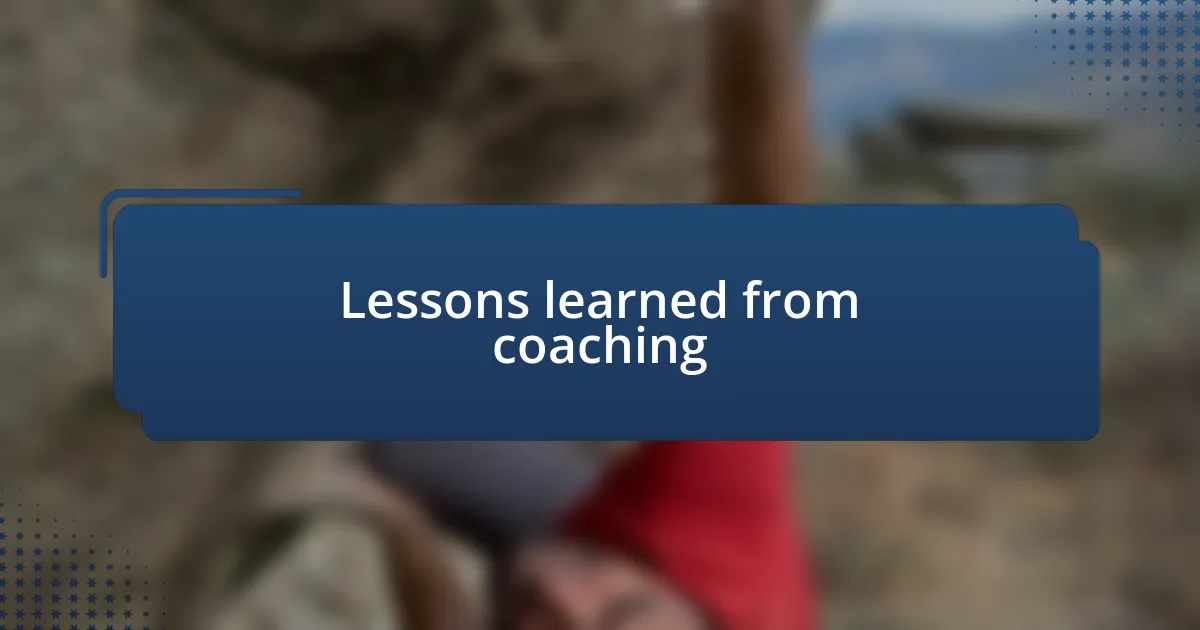Key takeaways:
- Early sports experiences taught the author resilience, teamwork, and the joy of movement.
- Overcoming mental challenges and embracing failure were crucial for personal growth in youth sports.
- Coaching emphasized adaptability, tailored feedback, and the emotional rewards of nurturing young players’ confidence.
- Creating a positive training environment and encouraging teamwork significantly enhance players’ development and camaraderie.

My early experiences with sports
From a young age, I was fascinated by the world of sports; I can still vividly remember the butterflies in my stomach before my first soccer match. That day, I stood on the field, a sense of camaraderie swirling around me as my teammates and I huddled together. It’s amazing how, even at such a tender age, the thrill of teamwork ignited a spark within me that I still cherish today.
I often think back to the countless afternoons spent playing basketball at the local court, where every missed shot felt like a lesson in resilience. There was one game, in particular, where I missed the final free throw, and as the ball bounced away, I felt disappointment wash over me. But in that moment, I also learned the power of perseverance—an invaluable lesson that would guide me through many challenges ahead.
Reflecting on those early experiences, I realize how they shaped both my character and my passion for sports. Engaging with friends while vying for a win fostered friendships and taught me the importance of respect and sportsmanship. Wasn’t it also about the joy of movement and the laughter shared after a good play—or even a bad one? Those are the memories that resonate with me, highlighting how sports can be a remarkable teacher of life skills.

Overcoming challenges in youth sports
Navigating the world of youth sports isn’t just about physical endurance; it’s also about overcoming mental hurdles. I remember a time when I faced fierce competition, and the pressure to succeed felt like a heavy weight on my shoulders. Similar to many young athletes, I battled self-doubt during critical moments, but learning to turn that anxiety into motivation was a turning point for me.
Here’s how I managed those challenges:
– Embracing Failure: I learned that each setback was an opportunity for growth rather than a reason to give up.
– Setting Realistic Goals: Creating small, achievable objectives helped me focus on my progress, rather than fixating on winning.
– Building a Support System: Surrounding myself with encouraging teammates and coaches made a significant impact on my journey.
– Practicing Mindfulness: Techniques like visualization allowed me to manage nerves and approach challenges with a clearer mindset.
– Staying Committed: Consistent training and dedication not only improved my skills but also reinforced my determination to push through tough times.

Lessons learned from coaching
Coaching young players has taught me invaluable lessons that extend beyond the sports field. One significant takeaway is the importance of adaptability; I often found that every team had unique dynamics and personalities. Adjusting my coaching style to meet the needs of each player brought out the best in them, reminding me that flexibility can lead to greater success.
Another lesson emerged from observing the diverse ways kids respond to feedback. Initially, I was unsure about the best approach to motivate each player. Through experience, I learned that it’s crucial to tailor my feedback—some players thrived on constructive criticism, while others needed a gentle touch to build their confidence. This taught me the power of understanding individual motivations.
The emotional rewards of coaching are profound. I remember a moment when a shy player scored their first goal after weeks of practice. Their joy was contagious, and in that instant, I realized that coaching is not just about developing athletes; it’s about nurturing their self-esteem and passion. It’s these moments that keep me inspired to continue guiding young players on their journeys.
| Lesson | Insight |
|---|---|
| Adaptability | Adjusting my coaching style fosters individual growth. |
| Tailored Feedback | Understanding each player’s motivation enhances their performance. |
| Emotional Rewards | Nurturing a player’s confidence is pivotal for their development. |

Building confidence in young players
Building confidence in young players is a crucial aspect of coaching that can change their entire experience in sports. I recall a time when I had a player who constantly doubted their abilities. One day, after a particularly challenging practice, I pulled them aside and highlighted the small victories they had achieved. By acknowledging their progress, their face lit up with a sense of pride that I had never seen before. It was a reminder to me of how powerful recognition can be.
Another critical element of building confidence is encouraging a growth mindset. I always emphasize to my players that mistakes are valuable learning opportunities. I share my own experiences, like the time I missed a crucial penalty kick, and how it fueled my determination to improve. When young players see their coach embracing failure and using it as a lesson, it shifts their perspective from fear of failure to excitement for growth.
Lastly, I believe in the importance of setting achievable goals. During one season, I introduced a “goal board,” where players could write down personal objectives, no matter how small. This initiative not only created a sense of accountability but allowed them to celebrate each other’s progress. Sometimes I ask my players, “What’s one thing you can achieve this week?” Watching them achieve these goals, however minor, dramatically boosts their self-esteem and fosters a supportive team environment where everyone believes in each other.

Creating a positive training environment
Creating a positive training environment starts with establishing trust among players. I vividly remember a session where I encouraged an open dialogue about everyone’s feelings and challenges. This simple act not only made the players feel valued but also fostered a sense of camaraderie that transformed our dynamics—how often do we overlook the power of communication in sports?
In my experience, maintaining a joyful atmosphere is key to effective training. I often incorporate fun games or themes into our sessions, like “Theme Day,” where players come dressed according to a chosen theme. It might seem trivial, but seeing everyone laugh and enjoy themselves invigorates the practice, turning what could be mundane drills into exhilarating experiences. Hasn’t everyone had a moment in sports when laughter brought a team closer together?
Lastly, I’ve learned that constructive feedback goes a long way in nurturing a positive environment. I make it a point to balance critiques with praise, focusing on strengths rather than solely areas for improvement. Recently, after a tough match, I highlighted a player’s relentless effort and teamwork before discussing tactical adjustments. Watching their eyes brighten with pride while still feeling motivated to develop was incredibly rewarding. Isn’t it amazing how a little affirmation can ignite a fire within young athletes?

Encouraging teamwork and collaboration
Encouraging teamwork and collaboration is essential for young players to learn the value of working together. I recall a tournament where we faced a formidable opponent. Instead of focusing on individual performances, I emphasized the importance of passing the ball and finding open teammates. The moment one of the younger players made an assist, their eyes lit up with joy—how rewarding it is to see teamwork transform individual efforts into collective success!
In my view, creating bonding activities off the field can significantly strengthen collaboration during games. One of my favorite experiences was organizing an outdoor day for the team, which included activities like trust falls and obstacle courses. Seeing players rely on each other physically and emotionally was eye-opening; have you ever witnessed how relationships can shift when players face challenges together? It’s like a whole new level of understanding emerges.
Moreover, I’ve found that celebrating small milestones fosters a sense of unity. After a successful game, I initiated a “team award” to recognize players who exemplified collaboration—like the player who continually encouraged others or the one who made an incredible assist. Watching their smiles as we shared these moments was priceless. In my experience, recognizing those contributions cultivates a deeper connection, making everyone feel integral to the team’s journey.





